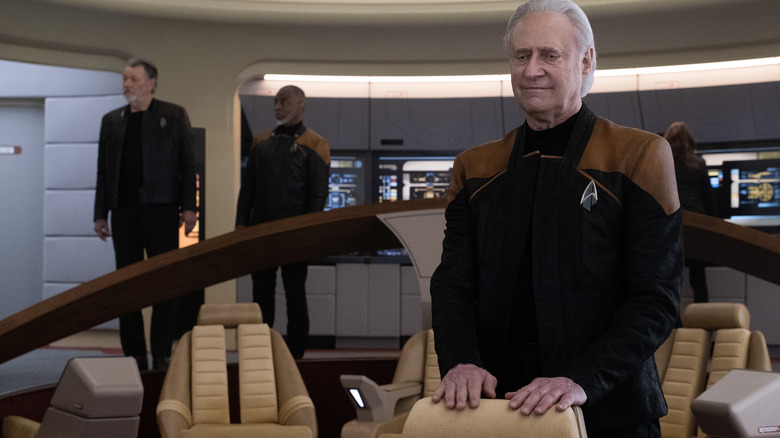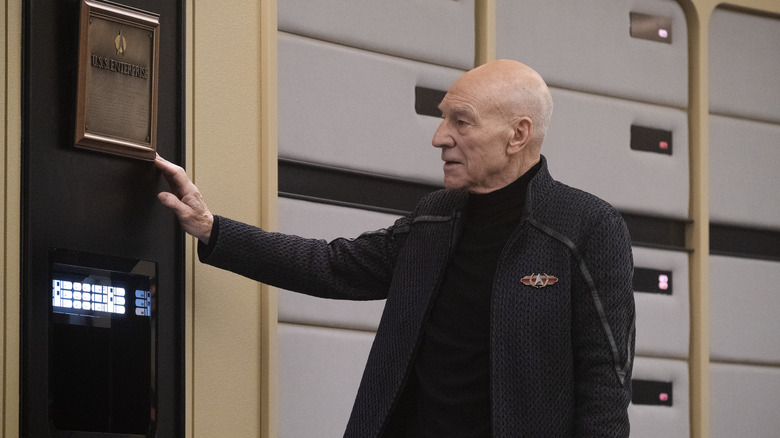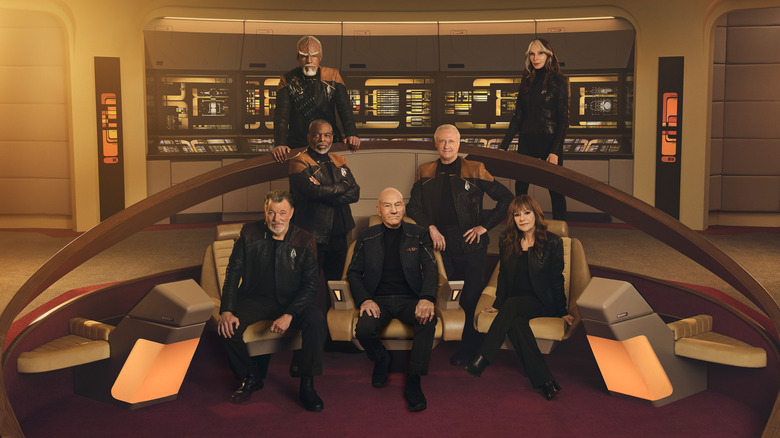Star Trek: Picard's Touching Final Scene Let The Cast Improvise For 45 Minutes
This post contains spoilers for the series finale of "Star Trek: Picard."
The final episode of "Star Trek: Picard" — called "The Last Generation" — begins in the middle of an action-movie-style crisis. Starfleet has been infiltrated by a Borg brain virus that had assimilated thousands of young people at the same time. Now compromised, hundreds of Federation vessels have their weapons trained on an enormous starbase, ready to kill everyone. Meanwhile, the cast of "Star Trek: The Next Generation" have gathered on a reconstructed Enterprise-D and charge out to Jupiter where a secret Borg base is hiding. Only once they are able to explode the Borg base, very much the way one might a Death Star, can the brain virus be erased and the assault ended. Also, they would save Jack Crusher (Ed Speleers), the son of Jean-Luc Picard (Patrick Stewart), and finally slay the evil Borg Queen (voice of Alice Krige).
The climax of the episode is tense and action-packed and all the usual things action climaxes ought to be. The nostalgia of seeing the NextGen cast back on board a recreated Enterprise-D set will likely inspire waves of nostalgia in some viewers. These are the perfunctory, expected elements of "The Last Generation" and, in many ways, its least interesting ones.
It's only after the day is saved that the best part of the episode happens. To celebrate their victory, the NextGen cast gathers at Guinan's bar for a drink. They chat idly, laugh, and are allowed to be themselves. It's a warm moment of genuine camaraderie more powerful than the show's constructed nostalgia moments.
In a recent roundtable interview attended by /Film's own Vanessa Armstrong, showrunner Terry Matalas said the moment felt so organic because he let the cast merely improvise for 45 straight minutes.
The poker game
The final shot of "The Last Generation" is a top-down angle of a poker game, a shot meant to mirror the final visual from the last episode of "Star Trek: The Next Generation." When filming that scene, Matalas, who wrote and directed the episode, had nothing but admiration for the rowdy ensemble. He said:
"They're maniacs, that cast. Anytime you cut, you call cut, they're singing, they're dancing, they're joking, they're blah, blah, blah, blah. They're doing all the things that they tell you to do."
Once the cast got into character and fell into a groove, Matalas elected to give them a "hang out" moment of epic proportions. Despite the tight shooting schedules usually involved with shooting television, Matalas allowed them time for a lot of riffing, actual laughter, and genuine emotion. It was a wonderful way to send the characters off, as audiences can enjoy who they are outside of "big" moments or action crises. It results in the best moment of the episode. Matalas said:
"[T]his isn't a movie set, where you have the time built in to let them do that. It's television. You're like, we got to go. Except for this scene. I let them improvise for 45 minutes and I rolled the camera and just let the cameras go, and let them play poker because I wanted the audience to really feel what it's like to hang out with these actors. To really feel like the jokes and the genuine smiles, the real camaraderie of what these actors, what it's like with them. They're really like you in real life. [...] I think on the Blu-ray, we'll see an extended version of that scene."
Fingers crossed.
The stars are in your favor
The show's final line of dialogue was, to Matalas, a challenge. Not only was it to be the final thought of the series, but it needed to stand up to the final line of "The Next Generation." Previously, in the episode called "All Good Things...," Picard dealt out playing cards, having finally joined his crew's poker game for the first time. He declares that "the sky's the limit," in terms of betting. Naturally, it means more than mere poker rules.
Matalas felt the pressure to come up with something comparable. When asked about the line, Matalas revealed his agony, but also his relief when a peer suggested something that felt perfect. He said:
"I didn't [write it]. Cindy Appel did. And it was tough. We sat in the room and ... we sat there and we're like, 'Guys, we're never going to beat 'All Good Things...,' but let's try. It's a great line. And Cindy got the closest with that line. 'The stars have always been in my favor' is probably the closest for a line that we could get. I knew I was going to end in that shot and stay in the shot for the credits, and so it needed to be something. But yeah, no, that's all Cindy, that one."
Appel had previously been a writer on the reboot of "MacGyver," the reboot of "The Odd Couple," and on "Desperate Housewives." She also served as a story editor on "Superior Donuts" and the Melissa George medical series "Heartbeat." "Star Trek: Picard" is her first science fiction series, but her expert handling of character was all that was required. The line served its purpose well.


